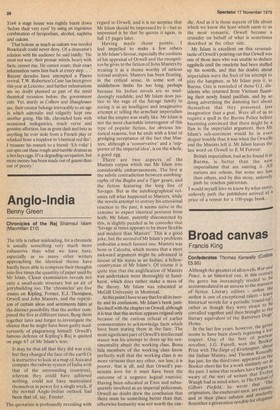Anglo-India
Benny Green
Chronicles of the Raj Shamsul Islam (Macmillan £10)
The title is rather misleading, for a chronicle is usually something very much more exhaustive than what we have here, especially as so many other writers approaching the identical theme have hardly been able to compress their thoughts into five times the quantity of paper used by Mr Islam. Closer examination reveals not only a small-scale structure but an air of jerrybuilding too. The 'chronicles are five essays on Kipling, Forster', E.J. Thompson, Orwell and John Masters, and the repetition of certain ideas and sentiments hints at the distinct possibility that the author composed the five at different times, flung them together later and forgot to investigate the chance that he might have been guilty inadvertently of plagiarising himself. Orwell's famous defence of Kipling's Raj is quoted on page 67 of Mr Islam's text: It may be that all that they did was evil, but they changed the face of the earth (it is instructive to look at a map of Asia and compare the railway system of India with that of the surrounding countries), whereas they, could have achieved nothing, could not have maintained themselves in power for a single week, if the normal Anglo-Indian outlook had been that of, say, Forster. regard to Orwell, and it is no surprise that Mr Islam should be impressed by it — but so impressed is he that he quotes it again, in full 15 pages later.
Having made those points, I feel impelled to make a few others in Mr Islam's favour, especially the coolness of his appraisal of Orwell and the recognition he gives to the fiction of John Masters by treating it as a theme worthy of serious textual analysis. Masters has been floating, in the critical sense, in some sort of middlebrow limbo for too long, perhaps because his Indian novels are so maddeningly readable, and Mr Islam does justice to the saga of the Savage family in seeing it as an intelligent and imaginative attempt at telling the armchair imperialists what the empire was really like. Mr Islam is not the most charitable interrogator of this type of popular fiction, for obvious historical reasons, but he ends with a kind of grudging acceptance of the fact that Masters, although a 'conservative' and a 'supporter of the imperial idea', is on the whole, a good egg.
There are two aspects of the Masters corpus which run Mr Islam into considerable embarrassments. The first is the subtle contradiction between autobiography of the Bugles and a Tiger genre, and the fiction featuring the long line of Savages. But as the autobiographical volumes tell what happened to Masters, while the novels attempt to convey his emotional reaction to thc past, it seems naive in the extreme to expect identical postures from both; Mr Islam, patently disconcerted by this, is slightly puzzled as he concedes that 'Savage at times appears to be more flexible and modern than Masters'. This is a good joke, but the second of Mr Islam's problems embodies a much funnier one. Masters was born in Calcutta, which means that a most awkward argument might be advanced in favour of his status as an Indian, a fellowcountryman of Mr Islam's. Of cOurse it is quite true that the anglification of Masters was undertaken most thoroughly at Sandhurst, which does rather make a mess of the theory. Mr Islam was educated at McGill University in Montreal.
At this point I have to say that for all its brevity and its confusions, Mr Islam's book justifies itself with the chapter on Orwell, although it is true that this section appears original only because of the curious refusal of earlier commentators to acknowledge facts which have been staring them in the face. The most significant part of Orwell's intellectual stance was his attempt to dress up his sentimentality about the working class. Bona fida members of the working class know perfectly well that the working class is no more virtuous than any other, nor less; it is poorer, that is all, and that Orwell's passionate love for it must have been the outcome of a negative logical exercise. Having been educated at Eton and subsequently involved as an imperial policeman, Orwell no doubt drew the conclusion that there must be something better than that, otherwise humanity was not worth the can dle. And as it is those aspects of life about which we know the least which seem to us the most romantic, Orwell became a crusader on behalf of what is sometimes described as the other side.
Mr Islam is excellent on this reversaltactic of Orwell's pointing out that Orwell was one of those men who was unable to deduce eggshells until the omelette had been stuffed up his nostrils, and that his doubts about imperialists were the fruit of his attempt to play the hangman, as Mr Islam puts it, in Burma. One is reminded of those G.I. dissidents who returned from Vietnam flaunting their newly found pacifism, and by so doing advertising the damning fact about themselves that they possessed less imagination than a gnat. Were all of us to require a spell in the Burma Police before becoming convinced that there might be a flaw in the imperialist argument, then Mr Islam's sub-continent would be in even deeper trouble than it was when the Orwells and the Masters left it. Mr Islam leaves the last word on Orwell to E M Forster: British imperialism, bad as he found it in Burma, is better than the new imperialisms that are ousting it. All nations are odious, but some are less than others, and by this stony, unlovelY path he reaches patriotism. I would myself love to know by what stony, unlovely path the publishers arrived at a price of a tenner for a 100-page book.






































 Previous page
Previous page